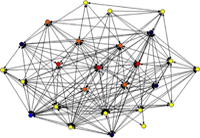
Update From Brett
Academic Analytics: Applying Them at Emory

Can analytics help more of our students reach their goals at Emory?
Imagine for a moment that you're a teenager again and facing Emory as an incoming freshman. You're excited, yes, but the four-year (or more) academic marathon you're about to enter might have you a little intimidated. Your family may have taken out sizable loans to give you this opportunity. You might even be the first in your family to go to college.
What if I could tell you within eight days of starting class whether you are going to get a D, an F, or withdraw from one of your classes — even if you don't have any grades posted in those eight days? Would that be useful information? There are emerging and repeated signs that this is possible.
As many as 70% of students with D/F/Withdraw outcomes can be found by digging through data we already capture. Applying data mining and business intelligence techniques to student data has the potential to offer skillful professors and savvy students unprecedented views into their own performance. Known as "Academic Analytics" this field is one of the areas I think has the most promise to deliver real value right to the heart of the academic mission of Emory.
There is more potential than just finding students at risk of bad grades but let's stay with that concept for a little longer. I recently spoke with Mike Mandl (Executive VP for Finance and Administration at Emory) about some recent Educause webinars I watched on this topic and how excited I was to explore the potential for implementing them at Emory. His first question stopped me in my tracks: "We don't have a problem with students failing out of Emory do we?" I had to admit that we don't. But then I wondered.
It didn't take long to find out that by any measure our "retention" (what percent of freshman come back for their sophomore year) and graduation rate (what percent graduate within six years) are top notch. Very few of our kids fail out, especially compared with the rest of the country. But among the top 25 schools, Emory ranks 24th in each category. Now consider the following: (1) these two factors alone account for 27.5% of our academic ranking and (2) a 2% increase in each factor would take us from the bottom of the pack to the middle of the pack. Emory doesn't have a problem with student performance; we have an opportunity.
 Academic Analytics doesn't tell you how using Blackboard makes you a good student. It tells you how good students use Blackboard. It tells you how bad students use Blackboard. It tells you how you are using Blackboard. Here's an interesting example taken from research done at the University of British Columbia. They looked at the social graph generated by their learning management system. The social graph (pictured on right) represents interactions between students and it turns out that good students have a much richer network of interactions. Not only did they have more interactions with more different students but good students tended to interact with other good students. Students who ended the class with a C didn't interact with nearly as many A students, either by posting questions or reading and rating answers written by A students.
Academic Analytics doesn't tell you how using Blackboard makes you a good student. It tells you how good students use Blackboard. It tells you how bad students use Blackboard. It tells you how you are using Blackboard. Here's an interesting example taken from research done at the University of British Columbia. They looked at the social graph generated by their learning management system. The social graph (pictured on right) represents interactions between students and it turns out that good students have a much richer network of interactions. Not only did they have more interactions with more different students but good students tended to interact with other good students. Students who ended the class with a C didn't interact with nearly as many A students, either by posting questions or reading and rating answers written by A students.
What educators do with information like this is still an open and largely unaddressed question. For examples of the effect of a social network in other aspects of our lives, see this excellent TED talk: http://www.ted.com/talks/lang/en/nicholas_christakis_the_hidden_influence_of_social_networks.html.
Here at Emory, I would hope that we can use the knowledge of how good students behave to encourage faculty to foster these behaviors in all students. My equal hope is that we can teach all students more about what success looks like in all its multitude of forms. And just as I wonder whether we can build a learning management system that watches you work with materials and starts to present lessons that match your preferred learning style, I also wonder if an LMS that watches the way you interact with others and how often you log in and participate with the materials can be a democratizing force that puts more tools for success in the hands of students who may not even know they are at risk.
As we near the completion of our second major Blackboard upgrade in 2 years, begin to move student email out of LearnLink, and eventually explore products like GoingOn for student collaboration environments, I think we have the important foundational infrastructure in place. Now I want to see whether we can apply the same type of data to the learning environment that we would expect in any other area of university administration or in any faculty member's area of professional research.
- Brett Coryell, Deputy CIO, OIT